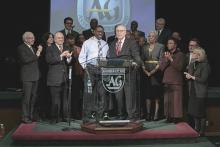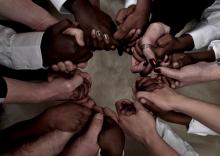Racial Reconciliation






When he was a boy, the Rev. Thomas Barclay noticed a difference between the worshippers of his small Pentecostal denomination and churches he visited of the larger Assemblies of God.
“Why are they all white and we’re all black?” he asked his father.
After a racial divide that lasted for nearly a century, the two denominations, the Assemblies of God and the United Pentecostal Council of the Assemblies of God, have agreed to a new partnership.


Death is horrible enough. But systematic injustice — one that allows white boys to assume success, yet leads black boys to cower from the very institutions created to protect our own wellbeing — is a travesty. Listen to the stories from Saturday and Sunday nights, of 12-year-old black boys who asked to sleep in bed with their parents because they were afraid. If black youth in America can’t rely on the police, the law, or their own neighborhood for protection — where can they go?

[Will Campbell] confused his critics – first the Right and then the Left – by insisting that his soul did not belong to any team – racial, political, religious, cultural. It belonged to the Kingdom of God. There was only one team, and that was the family of ALL God’s children everywhere.
Compassion came first in his hierarchy of values. Compassion led him to campaign for justice in the Civil Rights Movement, and compassion led him to sip whiskey with the cross-burners in the rocking chairs on their front porches. His was a ministry of reconciliation, a living, idiosyncratic expression a bold declaration of the biblical Gospel that God was in Christ reconciling the world to God’s own self.
This year marks a long list of anniversaries in our nation's long march for civil rights: We now mark 150 years since the Emancipation Proclamation; and 50 years since the Stand in the Schoolhouse Door, Martin Luther King, Jr.'s "Letter from Birmingham Jail," the March on Washington, the bombing at Sixteenth Street Baptist Church that killed four little girls, and the murder of Medgar Evers in his driveway.
In remembrance of the sacred journey, The Faith and Politics Institute's Civil Rights Pilgrimage drew more than 250 people, including 30 members of Congress, for a three-day tour of civil rights landmarks and first-hand testimonies from the movement's leaders. Throughout the pilgrimage — moving from Tuscaloosa to Birmingham to Montgomery to Selma — the delegation learned, grew, and continued the conversation together: white and black, Republican and Democrat, man and woman, senior and child. We all returned to Washington, D.C., and to our homes across the country, with a renewed sense of responsibility for the common good.
A number of events made the term 'reconciliation' mean more than the definition I had somehow created for myself over the past 30 years. Reconciliation is calling the person who beat and humiliated you 'brother.' Reconciliation is sharing a platform, sharing a deeply intertwined story — and sharing an authentic embrace — with the offspring of your parents' enemies.
[Photo Gallery at the jump.]

When Frederick Douglas assembled with other representatives at the National Colored Convention of 1853, they collectively condemned the nationwide epidemic of racial discrimination. As the gathering intended to discuss the circumstances and possibilities of “coloreds” (as they were called then), they recognized the various ways that “scorn and contempt” were heaped upon them — for no justifiable reason — by the white-skinned racial majority.
In remembrance of Douglas’ critique surrounding his 19th century “white countrymen,” and in recognition of our annual celebration of Black History Month, we in the U.S. continue to mourn the deep divisions that occur due to racial misunderstanding. In other words, as we take an inventory of race relations roughly 195 years after Frederick Douglas was born, we recognize that racial ignorance among far too many of our citizens continues to result in a disturbing level of collective indifference and social inequality.
Editor's Note: This column is part of a duo of posts commenting on racial reconciliation in light of Martin Luther King, Jr. Day. Read the accompanying piece, "A Convenient Truth: I Am White."
I am black in the United States of America. It is quite inconvenient to be black in the United States of America. It has always been inconvenient to be black in the United States of America.
My African ancestors were brought to the United States in chains against their will, taken straight to the plantations, and forced into slavery. They did not pass through Ellis Island, as did most of the ancestors of my white counterparts. My ancestors who fought in two world wars were not allowed any advantages of the GI Bill, schooling, the trade unions, or the opportunities of corporate America that white veterans had; therefore, as a black baby I am more likely to be born into a family who is mired in systemic poverty than a baby who is white.
I am much more likely to live in an impoverished neighborhood, receive an inferior education in a neighborhood school, and not graduate from high school than white students my age. Those are inconvenient truths.

Editor's Note: This column is part of a duo of posts commenting on racial reconciliation in light of Martin Luther King, Jr. Day. Read the accompanying piece, "An Inconvenient Truth: I Am Black."
I am white. It is quite convenient to be white. In fact, it has always been convenient to be white in the United States of America.
According to the U.S. Census Bureau, I am more likely to be employed than someone who is not white, I am less likely to be incarcerated, I am more likely to be covered by health insurance, and I am more likely to enjoy a comfortable retirement and eventually die peacefully in my elder years. I am more likely have a college education than a non-white person, my (white) wife is more likely to receive excellent medical care, my (white) children are more likely to attend private schools with skilled teachers, and my (white) family is more likely to have a roof over our heads, a few cars in the garage, and more than enough food on our table.
While individual cases vary, to be white is – generally speaking – a convenient truth.
There are countless factors one could cite for the current levels of race-based inequality in the U.S., and many opinions exist surrounding potential solutions, yet there are three points of emphasis that need to be addressed for the advancement of racial reconciliation.

When I stepped back and really thought about what I was experiencing on election night, I started thinking about the night of April 4, 1968, just hours after Martin Luther King, Jr. was assassinated. Having not yet been born, I thought about the coverage of it that I’ve seen. About how Robert Kennedy found himself in front of a crowd of supporters for a presidential campaign rally in Indianapolis. Many there that night were black and hadn’t heard the news of King’s death. As he did with most difficult topics, Kennedy laid it all out there. The crowd gasped and screamed and cried. Kennedy said he understood the anger and hate each of the men and women there that night would probably feel. After all, a white man had also killed his brother.
“What we need in the United States is not division,” Kennedy told the crowd. “What we need in the United States is not hatred. What we need in the United States is not violence and lawlessness, but is love and wisdom and compassion toward one another. A feeling of justice toward those who still suffer within our country.”
[Read more of this blog conversation in response to the Sojourners magazine article "